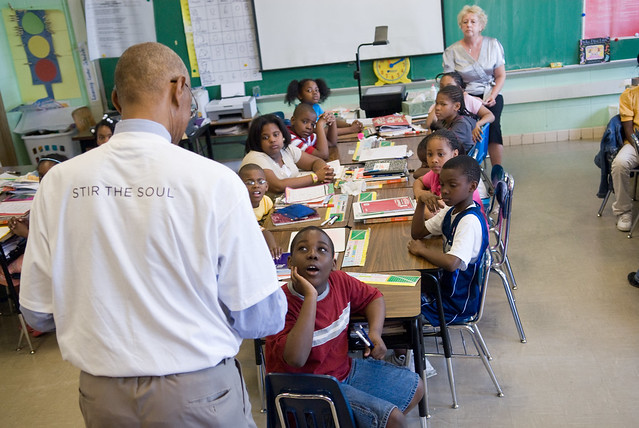 Everyone who works in the field of education has to bite their tongue on occasion when that guy at the dinner party says, "Oh yeah? You're a teacher, huh? You know what would really fix our education system? If we just..."
Everyone who works in the field of education has to bite their tongue on occasion when that guy at the dinner party says, "Oh yeah? You're a teacher, huh? You know what would really fix our education system? If we just..."Earlier this month, Parenting the Core posted a provocative piece called The Teachers. This weekend the post got a second spin around the web when The Answer Sheet re-posted it.
The Teachers goes into a subject I've discussed often while studying at a School of Education: Since most people in the country have spent at least fifteen years in school, most people think they are experts on schools.
This frustrates teachers, administrators, and researchers; all of who are experts on different aspects of schools - all of who understand how complex the process of teaching is.
The Teachers voices that frustration particularly well when it switches over to the second-person point of view.
All of you former students who are not teachers and not lawyers, you have no more idea of what it is to teach than you do of what it is to practice law.
All of you former students: you did not design curricula, plan lessons, attend faculty meetings, assess papers, design rubrics, create exams, prepare report cards, and monitor attendance. You did not tutor students, review rough drafts, and create study questions. You did not assign homework. You did not write daily lesson objectives on the white board.And while I think the frustration in The Teachers is merited, the frustration may undermine a more important message.
I think the author got to the core of the issue here:
The people I encounter out in the world now respect me as a lawyer, as a professional, in part because the vast majority of them have absolutely no idea what I really do.At the root of the frustration expressed in The Teachers is the idea that teachers are not professionals. And I think that idea contributes to some of the systemic problems plaguing the education system.
We treat teachers like labor:
- They are not involved in the creation of the standards by which they are measured
- Districts often tell them what texts and materials to use
- We protect poor performers
And yet, we expect teachers to perform like professionals:
- The students they work with arrive with varied skills sets that must be evaluated then adapted to
- The workplace is a dynamic setting
- The skills being developed do not develop in a standardized way
- The work requires specialized knowledge of both content and delivery
Being treated one way and having a different set of expectations is a frustrating experience.
So why does the frustration expressed in The Teachers leave me feeling a bit uneasy?
Well, it's this sentiment, 'You have no idea what's it's like.'
I'm sorry, but that sounds like an angry teenager who hasn't yet figured out how to argue with parental authority.
If people don't understand what makes a teacher a professional, then shouldn't we try and show them?
What does it take to design curricula?
What do teachers do to plan lessons?
Why is attending faculty meetings so demanding (and it is, but why)?
What does assessing papers entail?
How do you design rubrics, create exams, or prepare report cards?
Is monitoring attendance difficult?
What does it mean to tutor students?
Why do teachers review rough drafts or create study questions?
How does a teacher assign homework?
What are daily lesson objectives, and why put them on the white board?
The Teachers claims that most people "have absolutely no idea what [the author] really" does as a lawyer, but how true is that really? Most voting adults understand how complex criminal law, contract law, and civil law are. Most people understand that lawyers have to do a lot of difficult specialized writing. Most people know that lawyers are expected to be familiar with tough professional standards and a broad spectrum of professional knowledge.

Where do we learn all that from? TV, the news, movies, books, school, any attempt to do business that requires a lawyer, etc. We learn it because lawyers present their work to the public and demonstrate that it is work that requires a professional.
I know teaching is work that requires a professional.
The Teachers did not have to convince me to change my views. So, when I read that frustrated tone, I thought, "Hear, hear!"
But when I think of that guy at the dinner party - the guy who thinks anecdotes from his life experience will "fix education," I can see how this argument requires more than a frustrated tone.
No comments:
Post a Comment